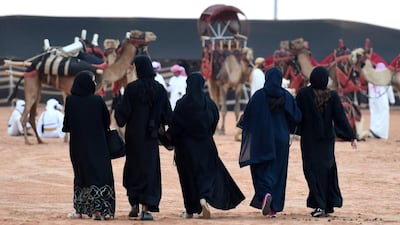AL SAYAHEED, SAUDI ARABIA // In the red desert village of Al Sayaheed, about 120 kilometres north-east of Riyadh, a large black camel of the Majahim breed is in a foul mood.
Even with two of its legs loosely tied together, the camel is resisting all efforts to move it along, and keeps on looming over a Toyota pickup, exhibiting the determination and obstinacy for which the animal is famous. And one more: sensitivity.
“He is worried about his family,” says Abdullah Tamim, the owner of the camel and its mate, a brown female of the Al Homr breed who had given birth a few days earlier.
The female calf is ill and unable to stand, so Tamim and the mother stay by its side while the father is led away to one of the beauty contests being held at the first official King Abdulaziz Camel Festival.
The largest such event in the region is being held this year from March 19 until April 15 and according to the organisers has so far brought an average of more than 35,000 visitors a day to Al Sayaheed, a small village in the Rumah governorate of Riyadh province that was this year designated the festival’s permanent home.
The location was for centuries a meeting point for camel caravans arriving from all points on the Arabian peninsula, carrying goods and trading animals. Now the King Abdulaziz Foundation for Research and Archives that organises the festival wants to make it the camel capital of the world and part of the transformation of Saudi Arabia’s oil-dependent economy.
“We want this location to become the reference point for everything camel related,” said Dr Fahd Al Semmari, the foundation’s secretary general.
Plans include expanding the festival beyond its entertainment elements to include a centre for camel research, including scientific studies of camel milk and its benefits, as well as a hospital for camels.
“We are competing against the horse, who gets the high end of everything: the best attention, the most prestigious festivals and the best prizes,” said Al Semmari.
The festival this year is open to visitors from around the world for the first time, with special visas on arrival being issued through the festival’s website.
“As part of the 2030 Vision, Saudi Arabia is now focused on expanding its cultural and tourism environment,” Dr Al Semmari explained.
There are about 30,000 camels and more than 1,300 owners from across the GCC taking part in the festival this year.
The prize money for the “Miss Camel” beauty contests (in which male camels also compete) totals more than Dh112 million. So far, at least three entrants have been disqualified for “fake lips” – where the lips were injected with silicone.
There are also camel auctions, poetry competitions (with Dh14 million in prizes), dancing children dressed up as camels and interesting camel facts – everything from which country has the largest number of camels (Somalia, with 7.1 million), to camel references in the Quran and the Prophet Mohammed’s famous female camel Al Qaswa who died of grief upon her master’s death.
There is a special exhibition on the history of camels and vets on site to assist ill or injured camels and worried owners like Tamim.
“This little one is part of my family now. I have to do whatever is possible to save her,” said Tamim, a Saudi in his 40s. The latest in along line of camel herders, he has been caring for them since he was 6 years old.
Traditionally, they would try to jolt the calf’s nervous system using a form of acupuncture and cauterisation. Now he sat stroking the newborn, even blowing into her mouth to help her breathe while he waited for the vet. The calf’s mother grunted mournfully as she nudged her little one. Another famed camel trait, says Tamim – Al Umoma, or motherhood.
“She will stay by her baby’s side until the end,” he said. “Camels are very intelligent. They remember everything, and so if you are kind to them, they will love you wholeheartedly, but if you are mean to them and hurt them or any member of their family, they will hold a grudge and even take revenge. Never mess with a camel – they were not just used for transportation, they were once formidable soldiers, tougher than any man.”
Al Sayaheed also has an important place in the history of the camel as combatants. It was the operations base for the camel-mounted followers of Saudi Arabia’s founder, King Abdul Aziz, during his campaign to unify the country nearly 85 years ago.
Despite modernisation, the camel is no less important today in Saudi society, said Dr Al Semmari.
“In the 1940s, when cars were being introduced to Saudi Arabia, people said it was the end of camels,” said Dr Al Semmari. “But decades later, here we are, and camels are still king.”
rghazal@thenational.ae

